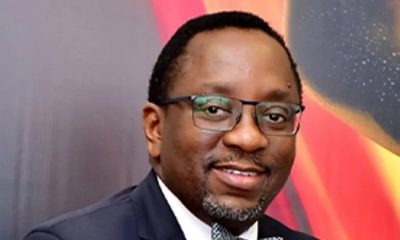Economy
TLcom Closes Africa’s Largest Early-Stage VC Fund Worth $154m

By Adedapo Adesanya
Africa-focused venture capital firm, TLcom Capital, has announced the final close of TIDE Africa Fund II, its second fund for technology in Africa, valued at $154 million.
The oversubscribed round confirms the firm’s status as Africa’s largest Seed and Series A investor and accelerates the firm’s mission to partner with elite founders to tackle Africa’s biggest and most complex challenges with innovative solutions that will unlock massive value in the continent’s critical sectors.
The fund at more than twice the size of TLcom Capital’s first fund saw participation from several new, high-profile LPs alongside returning LPs from the firm’s first Africa- focused fund, TIDE Africa Fund I, closed in 2020. These include the European Investment Bank (EIB), Allianz and DEG Impact’s joint venture, AfricaGrow, Visa Foundation and Bertelsmann.
TLcom Capital will also maintain its early-stage, multi-sector focus and expand its mandate beyond Sub-Saharan Africa to Egypt.
With its new fund, TLcom Capital plans to deploy significant additional capital into female-founded African tech startups, building on the firm’s June 2022 co-investment commitment of $2 million to FirstCheck Africa, a female-focused pre-seed fund. TLcom Capital’s commitment to gender balance is reflected in its majority-female partnership and investment committee.
According to a statement shared with Business Post, the fund has already made its first investments in South Africa and Egypt with LittleFish, a software company enabling payments and banking products for retail-focused SMBs, headquartered in Cape Town, and ILLA, a middle-mile logistics platform headquartered in Cairo.
Speaking on the development, Mr Maurizio Caio, Founder and Managing Partner at TLcom Capital, said there will be no core changes to its investment strategy as it will make initial investments of $1 million to $3 million, maintaining significant follow-on capacity to support strong portfolio performers into their growth stages, where the fund continues to see massive upside potential.
“We are maintaining the same investment strategy for TIDE Africa Fund II as we had for our first fund, which made over 80 per cent of its investments at Seed or Series A. With this final close, we’re thrilled that TLcom is in an even stronger position to continue to partner with Africa’s most talented entrepreneurs from early in their company-building journeys. We’re also excited to spend more time in the Egyptian ecosystem, co-investing alongside the most active local funds. TLcom is well on its way to realising our ambition of becoming Africa’s most sought-after early-stage VC and a truly pan-African firm.”
Since TLcom Capital announced TIDE Africa Fund II’s first close in January 2022, the firm has also significantly expanded its team, adding investment and operational capacity by doubling its headcount to 15 employees, including new investment professionals in Nigeria and Kenya.
“Across Africa, access to capital remains limited, especially for early-stage startups,” said Mr Ambroise Fayolle, Vice President and Head of Investments at the European Investment Bank. “At the same time, a young, technology-savvy population provides fertile ground for young companies. Africa’s startup ecosystem has the potential to drive inclusive economic growth and foster positive social change, which the EIB is happy to support. Through our investment in TLcom’s TIDE Africa II Fund, we expect to build and expand on the success and impact of the first TIDE Africa Fund, delivering much-needed capital to the most promising high-growth companies.”
Adding her input for Visa Foundation, Ms Najada Kumbuli, Vice President & Head of Investments, Visa Foundation said, “Our investment in TIDE Africa Fund II demonstrates our dedication to helping build strong economies where businesses can prosper and generate substantial financial and impact returns. We are impressed by TLcom’s track record of supporting visionary entrepreneurs in developing high-growth business models that can capitalise on Africa’s considerable economic potential.
“The firm’s alignment with Visa Foundation’s mission reinforces our confidence that, through this partnership, our capital will help create the next generation of successful and diverse entrepreneurs that will shape the future of the continent.”
Economy
Stock Market Gains N2.367trn as All-Share Index Rises 2.06%

By Dipo Olowookere
The Nigerian Exchange (NGX) Limited appreciated by 2.06 per cent on Friday, amid a rush for local equities due to encouraging earnings of companies for 2025.
Business Post reports that the buying pressure was across the key sectors of Customs Street yesterday, with the banking index growing by 2.49 per cent. The energy industry appreciated by 2.05 per cent, the consumer goods counter grew by 0.78 per cent, the insurance space improved by 0.64 per cent, and the industrial goods sector expanded by 0.44 per cent.
At the close of trades, the market capitalisation went up by N2.367 trillion to N117.027 trillion from N114.660 trillion, and the All-Share Index (ASI) gained 3,687.45 points to close at 182,313.08 points compared with the previous day’s 178,625.63 points.
Cornerstone Insurance, Infinity Trust, and Nestle Nigeria appreciated by 10.00 per cent each to sell at N6.38, N9.90 and N2,662.00, respectively, while Okomu Oil rose by 9.99 per cent to N1,327.00, with RT Briscoe up by 9.97 per cent to N17.42.
Conversely, SAHCO depleted by 10.00 per cent to M135.00, Guinness Nigeria lost 9.97 per cent to trade at N103.00, Omatek shrank by 9.39 per cent to N2.99, NPF Microfinance Bank decreased by 6.51 per cent to N5.60, and eTranzact slipped by 6.33 per cent to N10.80.
A total of 53 stocks ended in the green side and 33 stocks finished in the red side, representing a positive market breadth index and strong investor sentiment.
Data showed that 936.4 million shares valued at N52.7 billion were transacted in 50,068 deals on Friday versus the 698.3 million shares worth N28.438 billion traded in 50,886 deals on Thursday, indicating a rise in the trading volume and value by 34.10 per cent, and 85.56 per cent apiece, and a slip in the number of deals by 1.61 per cent.
First Holdco closed the session as the most active equity with 106.3 million units worth N5.1 billion, Zenith Bank transacted 72.6 million units valued at N5.7 billion, United Capital traded 45.4 million units for N963.2 million, GTCO sold 45.0 million units worth N4.9 billion, and Fidelity Bank exchanged 31.4 million units valued at N639.0 million.
Economy
OTC Securities Exchange Extends Positive Run by 0.86%

By Adedapo Adesanya
The NASD Over-the-Counter (OTC) Securities Exchange rose further by 0.86 per cent on Friday, February 13, with the market capitalisation growing by N20.27 billion to N2.378 trillion from the previous session’s N2.357 trillion, and the NASD Unlisted Security Index (NSI) rising by 33.87 points to 3,974.77 points from the 3,940.90 points it ended a day earlier.
The improvement recorded by the bourse yesterday was influenced by six price gainers led by Okitipupa Plc, which went up by N18.00 to sell at N260.00 per share compared with the previous day’s N242.00 per share.
Further, Central Securities Clearing System (CSCS) Plc added N3.39 to quote at N80.47 per unit versus N77.08 per unit, IPWA Plc chalked by 31 Kobo to finish at N3.44 per share versus N3.13 per share, Lagos Building Investment Company (LBIC) Plc gained 31 Kobo to settle at N3.41 per unit versus N3.10 per unit, Afriland Properties Plc appreciated by 31 Kobo to N16.51 per share from N16.20 per share, and Food Concepts Plc increased by 8 Kobo to N3.28 per unit from N3.20 per unit.
There were three price losers, led by MRS Oil Plc, which weakened by N10.00 to close at N170.00 per share compared with Thursday’s price of N200.00 per share, FrieslandCampina Wamco Nigeria Plc lost N2.59 to sell for N65.52 per unit compared with the preceding session’s N68.10 per unit, and Geo-Fluids Plc depreciated by 33 Kobo to N3.30 per share from N3.63 per share.
During the session, the volume of securities transacted by the market participants went up by 9.5 per cent to 9.4 million units from 8.6 million units, the value increased by 1,206.5 per cent to N703.6 million from N53.9 million, and the number of deals grew by 7.1 per cent to 45 deals from 42 deals.
CSCS Plc remained the most traded stock by value (year-to-date) with 27.1 million units exchanged for N1.5 billion, followed by Resourcery Plc with 1.05 billion units traded at N408.6 million, and Geo-Fluids Plc with 29.9 million units valued at N152.6 million.
Resourcery Plc ended the day as the most traded stock by volume (year-to-date) with 1.05 billion units sold for N408.6 million, followed by Geo-Fluids Plc with 29.9 million worth N152.6 million, and CSCS Plc with 27.1 million units sold for N1.5 billion.
Economy
Naira Value Further Dips 0.13% to N1,355/$1

By Adedapo Adesanya
The Naira depreciated further against the United States Dollar by N1.76 or 0.13 per cent on Friday in the Nigerian Autonomous Foreign Exchange Market (NAFEX) to close at N1,33.42/$1, in contrast to the N1,353.66/$1 it was exchanged a day earlier.
However, the Naira appreciated against the Pound Sterling in the same market window yesterday by N5.05 to trade at N1,844.59 versus Thursday’s closing price of N1,849.64/£1, and against the Euro, it improved by 75 Kobo to quote at N1,60/€1 versus the previous day’s N1,608.68/€1.
At the GTBank FX desk, the domestic currency lost N6 on the US Dollar on Friday to settle at N1,365/$1 versus the preceding session’s N1,359/$1, and at the parallel market, it chalked up N10 to trade at N1,430/$1 versus the previous day’s N1,430/$1.
The weakening of the Nigerian currency in the official market happened as the Central Bank of Nigeria (CBN) refrained from intervening in the official window.
The FX supply side was eclipsed by growing demand for foreign payments. Exporters’ inflows, non-bank corporate supply, and other market participants’ contributions had enhanced the FX liquidity level.
Pressure came with the entry of all duly licensed Bureau De Change (BDCs) into the official foreign exchange, although there are indications that the move will help the Naira-US Dollar exchange value, as BDC operators have started approaching their banks to understand the operational modalities and framework for accessing Dollars.
As for the cryptocurrency market, benchmarked tokens improved as US interest rate futures on Friday raised odds of rate cuts by the Federal Reserve after a report that showed inflation rose less than expected in January.
Data showed the Consumer Price Index (CPI) rose 0.2 per cent last month after an unrevised 0.3 per cent gain in December, with Solana (SOL) up by 7.9 per cent to $85.17, and Ethereum (ETH) up by 6.5 per cent to trade at $2,059.78.
Further, Cardano (ADA) added 5.3 per cent to close at $0.2758, Ripple (XRP) jumped 5.1 per cent to $1.42, Bitcoin expanded by 4.8 per cent to $69,357.35, Litecoin (LTC) grew by 4.7 per cent to $55.27, Binance Coin (BNB) jumped 4.0 per cent to $621.88, and Dogecoin (DOGE) increased by 3.8 per cent to $0.0965, while the US Dollar Tether (USDT) and the US Dollar Coin (USDC) remained unchanged at $1.00 each.
-

 Feature/OPED6 years ago
Feature/OPED6 years agoDavos was Different this year
-
Travel/Tourism10 years ago
Lagos Seals Western Lodge Hotel In Ikorodu
-

 Showbiz3 years ago
Showbiz3 years agoEstranged Lover Releases Videos of Empress Njamah Bathing
-

 Banking8 years ago
Banking8 years agoSort Codes of GTBank Branches in Nigeria
-

 Economy3 years ago
Economy3 years agoSubsidy Removal: CNG at N130 Per Litre Cheaper Than Petrol—IPMAN
-

 Banking3 years ago
Banking3 years agoSort Codes of UBA Branches in Nigeria
-

 Banking3 years ago
Banking3 years agoFirst Bank Announces Planned Downtime
-

 Sports3 years ago
Sports3 years agoHighest Paid Nigerian Footballer – How Much Do Nigerian Footballers Earn




















